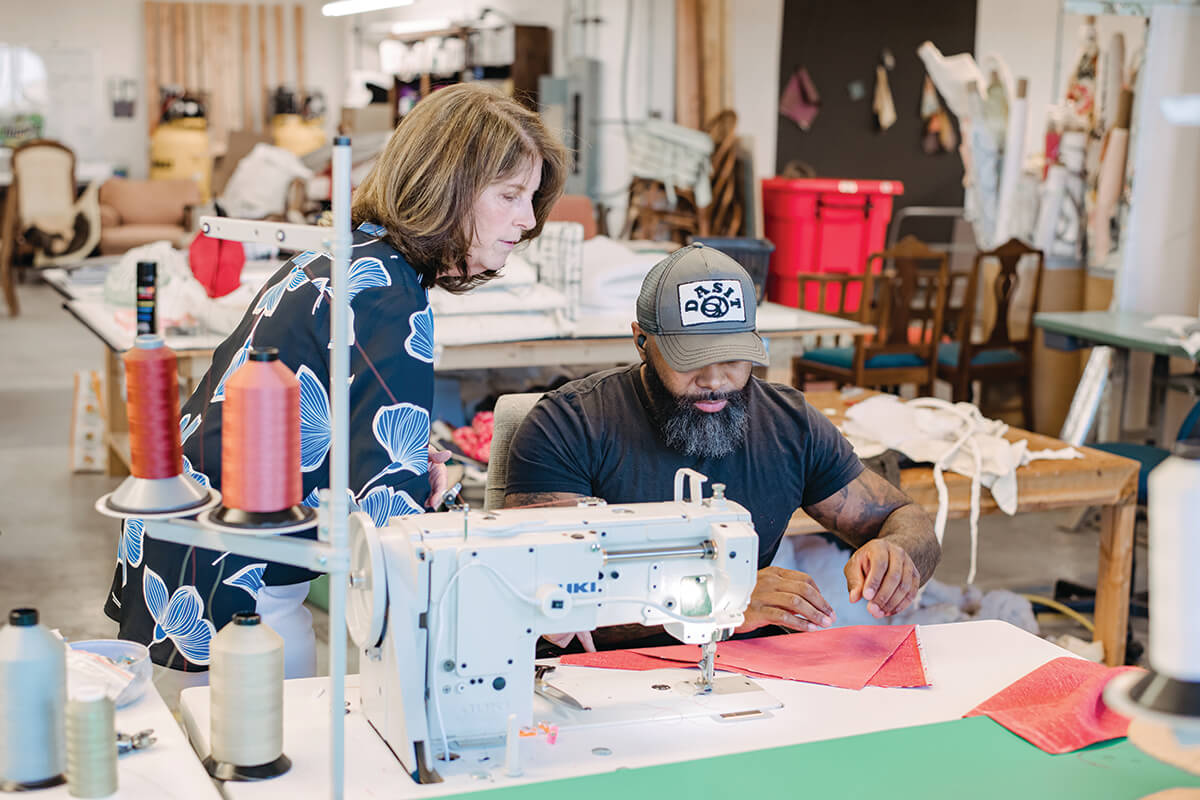Home & Living
The Cavanagh House is Creating Jobs, Along With Custom Home Décor
Stacy McAleer's upholstery and fashion apprenticeship programs are designed to help those looking for financial stability create a lifelong career in in-demand trades.

In the Baltimore Innovation Center on Wicomico Street, Stacy McAleer sits amid massive worktables surrounded by bolts of fabric, furniture in various states of disassembly, and cavernous walls lined with enormous spools of colored thread. A small group of men and women are busy measuring and cutting fabric, sewing it, and stapling it to furniture.
This upholstery program is one half of The Cavanagh House (TCH), the nonprofit McAleer opened in 2019 that also includes a garment/fashion program. The apprenticeship programs are designed to help those looking for financial stability to get the training needed to create a lifelong career in in-demand trades while providing the community with much-needed services. And it all began with a person McAleer met only once.
“One day I was walking into Chipotle and there was a man outside asking for money,” she says. She asked the gentleman to join her. Over lunch she learned about his life, both the opportunities he’d had and the poor decisions he made that were difficult to recover from because he lacked the support of family and financial stability.
“I realized there were probably a million people out there like him who just needed a little support to get back on their feet,” says McAleer. “That’s sometimes all someone needs—that safety net, and the chance to break that cycle.”
McAleer ended up putting the man up in a hotel for the weekend. She never saw him again but, “I just couldn’t get him off my mind. This man has no idea what he inspired me to do.”
A self-taught sewer, McAleer initially thought she would teach sewing to those in need. Then she connected with Alan Ibello of Ibello Upholstery and learned how desperate that industry was for skilled workers. The concept for TCH galvanized.
Today, TCH is one of just five upholstery schools in the U.S.; most only teach car and boat upholstery. “The average age of an upholster is 50 to 60 years old,” she explains. “Even though the demand [for upholstery] is high, work rooms are closing all over the country from lack of staff.”
The organization began in a house on Main Street in Reisterstown that belonged to McAleer’s aunt, whom the nonprofit is named for. It’s fitting, as McAleer explains: “She was a teacher who believed that every child deserved an education.”
Now, the Main Street location houses the garment program, which is run like a fashion school and offers custom home décor, alterations, and garment construction. Students earn income from their work and because the training time is flexible, can have a job outside the program.
In November 2021, the upholstery program—which operates on commission—moved to Wicomico Street, where students can learn upholstery in a full-time, paid apprenticeship. Funding comes from the revenue from upholstery projects, alterations, and custom sewing as well as grants and donations.
But much of TCH’s success comes down to McAleer’s dedication—“I wear 50 hats,” she says with a smile—and committed volunteers. Students find TCH from diverse sources: Google, church bulletins, Baltimore County’s school-to-career-program, and immigrant and refugee resettlement organizations.
Unlike a traditional workroom, TCH offers wraparound supports like transportation assistance and courses in financial literacy and business plan creation. The goal is to get students employed in professional workrooms or provide them what they need to successfully operate their own. Just recently, McAleer graduated a single mom with three young children to a professional workroom in Abingdon.
Whether they’re reupholstering furniture, or making custom draperies, pillows, or restaurant banquette cushions, these apprentices are constructing better futures.